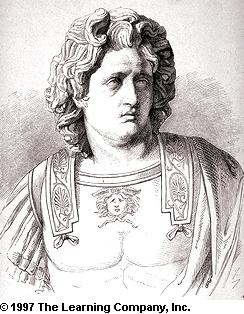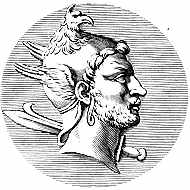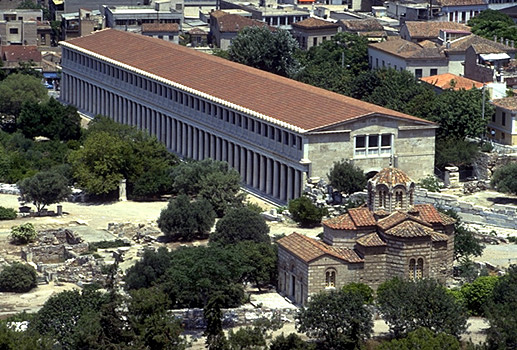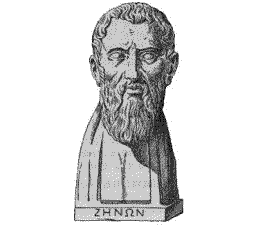 Alexander
the Great
Alexander
the Great
|
|
|
|
|
|
|
|
|
|
|
|
|
 Alexander
the Great
Alexander
the Great
The transitional time period from the Dark Ages in Greece, 1100-800B.C., through the Hellenistic time period after the expansionism of Alexander the Great, had vast implications on the minds of the Greek population. No longer centered around individual citizenship and the polis, the Hellenistic time period left Greeks with an existence void of many traditions which had given them stability in the past. In turn, people looked to philosophy, which sought to discover man’s new position in Alexander’s immense empire and to answer the questions where science could not. How was a man to conduct himself in this new type of world that developed out of the conquests of Alexander the Great? One of the most influential philosophies that became popular around the Hellenistic time period in 323 B.C., was Stoicism founded by Zeno of Citium. This particular philosophical theory centered on the ideal of man achieving harmony with nature, which in turn would lead to a virtuous life.
There are, in our world, numerous concepts and ideas which mankind has been able to comprehend to a limited degree: the inner complexities of an engine, the movement of the planets, as well as the intricate workings of the human body, for example. All are portions of a well-defined system of knowledge belonging to the various branches of science. However, all of these realms of erudition border on an area of the unknown. As a result, when exploring these areas in depth, one passes from science into an area of exploration, speculation, and guesswork. This exploration is the very essence of philosophy. "In itself, philosophy sets out neither to solve our troubles nor to save our souls" (Russell 7). It is, as the Greeks put it, “a kind of sightseeing adventure undertaken for its own sake” (Russell 7). Therefore, when man asks specific questions concerning the nature of science, philosophy springs forth to enhance the exploration itself. The first people to evince this kind of curiosity were the Greeks. Between 800-250B.C., the Greeks made remarkable advancements in areas such as art, literature, science, and philosophy which set the standard for Western Civilization and provided the model which many of their successors used as the origin of their intellectual investigations (Russell 7).
Philip II of Macedonia

Among the early civilizations of the Western world, Greece is considered to be relatively late in its development. Dating back more than a millennium prior to the development of Greece, civilizations such as Egypt and Mesopotamia thrived and possessed an extensive religious realm but lacked a concrete philosophical domain (Casson 12). This was also the case with the trading community of the Minoans that originated on the island of Crete, just off the coast of southern Greece (Casson 13). On the Greek mainland, during the Dark Age which spanned approximately from 1100-800 BC, the development of the Greek city-state emerged. Known as a polis, this basic political and institutional unit allowed for a universal feeling of “oneness” among the city with the idea that the people made the polis not elite governmental officials (Casson 41). Unlike the large-scale, ‘bureaucratic’ monarchies of the east, the polis was an ideally autonomous community of citizens that was tied to a specific territory. Within these small-scale societies, concepts such as civic duty, social justice, and individual liberty were an immediate concern to more than just the narrow elite and provoked contemplation on the nature of citizenship itself (Casson 42). These ideas manifested themselves in such early philosophical writings as Plato’s Republic, which dealt with such issues as the ideal polis community.
The concept of the small society dissipated and slipped away from Greek civilization however. Around 338 B.C., with the Battle of Chaeronea and later the development of the League of Corinth, Greece was brought under the control of the Macedonian expansionist, Philip II, and his successor and son Alexander the Great (Casson 108). Together they developed a new social structure and along with it there emerged a different social standing of the Greek people. By overthrowing the Persian Empire and spreading Greek culture, ideas, and language throughout the west, Alexander the Great was responsible for the emergence of a new era known as the Hellenistic Era which began after his death in 324B.C. (Casson 108). During the Hellenistic time, the idea of the polis declined along with the notion that a person possessed a role as a citizen in the community and had a voice in governmental and societal issues. Due mainly to the vast empire Alexander forged, politics were no longer an intellectual refuge for individuals. Also, as a result of Alexander's expansionism, cities seemed unstable; people felt uprooted and lacked traditions that once held the people of the polis together. Many citizens searched for permanence in their lives to counter their feelings of being a miniscule entity among thousands in an immense empire (Casson 108). Alexander the Great not only was a conqueror, but also a colonizer who established cities throughout his vast empire that stretched from the Nile in Egypt to India. Because of his expansionism, Greek language and customs permeated throughout most of the known world (Casson 111). This incredible shift in the status of man led to new philosophical endeavors that sought to uncover man’s position in the newly formed society and what ways he should go about living his life in a seemingly overpowering, enormous, and unfamiliar world.
 The Painted Stoa located in Athens, Greece. It was used by
Stoics to discuss their ideas and doctrines. The name Stoicism is derived
from the name of this building.
The Painted Stoa located in Athens, Greece. It was used by
Stoics to discuss their ideas and doctrines. The name Stoicism is derived
from the name of this building.
The goal of much philosophical inquiry during this time was centered upon securing human independence from the effects of chance or other worldly events. Hellenistic philosophy itself was regularly divided into three related areas: logic (the process for discovering truth), physics (the fundamental truth about the nature of existence), and ethics (the way human begins should achieve happiness and wellbeing as a consequence of logic and physics) (Martin 212). The most influential philosophical movement that developed a few years before, but flourished during, the Hellenistic period was Stoicism. The name Stoicism is derived from a type of building known as a Painted Stoa located in Athens, Greece. It was at this location where Stoic philosophers discussed their various ideas and doctrines (Martin 214). The founder of the movement was a Phoenician named Zeno of Citium in Cyprus around 335 B.C. (Russell 110). It is accredited, however, to Chrysippus from Cilicia in Anatolia as making the philosophy into a comprehensive guide to life. Stoic philosophy was prominent for five centuries and, during that time, many changes in its principles were seen. One element that remained constant throughout its existence, however, was its ethical teachings (Martin 214). The Stoic ideal necessitated that one be in accordance with the nature of man and that of the universe. In addition, no man was permitted to commit any actions that were in disagreement with the universal laws of the world. Man gained understanding of the natural laws through the use of reason (Donagan 2). Virtue consisted of putting oneself in harmony with nature, that is, the rational force of divine providence that directed all existence under the guise of fate (Martin 215). "Reason, as well as experience, should be used to discover the way to harmony attained only by possessing virtue" (Martin 214). "Courage in the face of danger, suffering, and indifference, good sense, and temperance were the virtues that stoics valued" (Martin 214). The attainment of endurance and calmness would lead to tranquility according to the Stoic (Martin 214). The focus on endurance and detachment has given the word "stoic" it's commonly accepted meaning today (Russell 112). In addition, death was not to be feared as Stoics held the belief that we will cyclically repeat our lives over again once we die. This repetition occurred as the world was periodically destroyed by fire and then reformed following its destruction (Martin 214).

The Stoic’s belief that fate was responsible for everything that happened,
prompted one of the principal issues of the philosophical movement, that
of determinism and free will and whether or not human beings possessed
it. According to Zeno, nature is ruled by law. The laws in
conformity with which the world runs its course emanate from some supreme
source that governs all of history and which exists intimately within the
confines of the world and within every individual. He purported that
everything happened for some pre-ordained purpose (Russell 111).
Furthermore, purposeful human fundamental actions did have significance.
Therefore, what mattered in life was striving for good in one’s intentions
and not in the outcomes of one’s actions. Worldly goods were said
to be of little significance because, to the Stoic, all material wealth
could easily disappear
(Russell 111). However, virtue, an internal inalienable possession,
could not be taken from us. By rejecting external material wealth,
a man could become free because external forces could not hinder virtue,
which is of the utmost importance to man (Martin 214). In other terms,
the pivotal point in Stoic philosophical thought was the recognition that
in some sense the internal good of virtue was more vital than other things.
Losses of material wealth could always be replaced, but if one lost self-respect,
they became dehumanized. According to Stoics, their philosophy was
applicable to all and was not limited to males alone. Stoicism thus introduced
a radically new idea into the minds of people during the Hellenistic times
(Martin 214). This concept was one that not only set the stage for philosophers
to come, but one that also obliterated unnecessary distinctions between
woman and man.
Stoicism did not diminish as time
passed and the age of Hellenism dissipated. Stoicism had a significant
impact on the thoughts and ideas of Western minds during the Hellenistic
time and beyond, introducing revolutionary ideas, some that have carried
over into present day society. In its conception of man, the Stoic
doctrine was more generous than previous theories. Stoicism held
that, in a sense, all men were created equal, even though during imperial
times, as were the Hellenistic times, slavery existed on a more massive
scale than ever before (Russell 113). Furthermore, Stoicism introduced
a distinction between natural law and the laws of the government; natural
law being the rights that man was entitled to only because of his innate
human nature. The doctrine of natural rights had beneficial
influence on Roman legislation in adjusting the social status of those
who were being wrongfully deprived of equal rights (Russell 113). Similarly,
in the post-Renaissance period the idea of equal status intervened in the
struggle against the conception of the divine right of kings over the rest
of the population (Russell 113).
With regards to specific philosophers who continued the legacy of Stoicism
beyond Zeno and Chrysippus, Benedict Spinoza popularized the idea of Stoicism
in modern times through his endorsement of the concept that God is an immanent
power among us (McGreal 217). In addition, the Stoic doctrines gained
ground in Rome through the literary activities of Cicero, who studied under
the Stoic philosopher Posidonius (Russell 112). Furthermore, a revolutionary
idea put forth by Stoicism, that of philosophy in conjunction with universality
and its applicability to both men and women, jarred the philosophical community
and paved the way for other modern philosophies to develop with this same
idea of equality as their basic foundations (Russell 112).
The popularity of Stoicism was a product of a new
type of era in Greece, one of expansionism and radical social changes.
Its foundations were reflective of this new type of world for the Greeks;
searching for answers to questions that science alone could not satisfy.
Just as it was necessary for man to explore and attempt to gain understanding
of the complexities of the physical world around him, so too did the Hellenistic
man yearn for answers to the inner complexities of himself. Despite
the years that separate the Ancient Greeks of Western Civilization and
modern man, we are still searching for our own answers as to our place
and significance in this ever-changing world around us.
Casson, Lionel. Treasures of the World: The Greek Conquerors. Chicago: Stonehenge Press Inc., 1981.
Donagan, Alan. The Theory of Morality. Chicago: The University of Chicago Press, 1977.
Martin, Thomas A. Ancient Greece: From Prehistoric to Hellenistic Times. London: Yale University Press, 1996.
McGreal, Ian P. Great Thinkers of the Western World. New York: HarperCollins Publishers, Inc., 1992.
Russell, Bertrand. Wisdom of the West. New York:
Crescent Books, 1989.
Map of Ancient Greece prior to Hellenistic times:
Detailed Map of Alexander the Great’s vast empire:
Broad view Map of Alexander the Great’s empire:
Timeline of Greek history up to Hellenistic times:
Greek Philosophy Timeline with link to a more detailed timeline:
A Timeline of Hellenistic Philosophy:
Created By: Callie I. Mencias